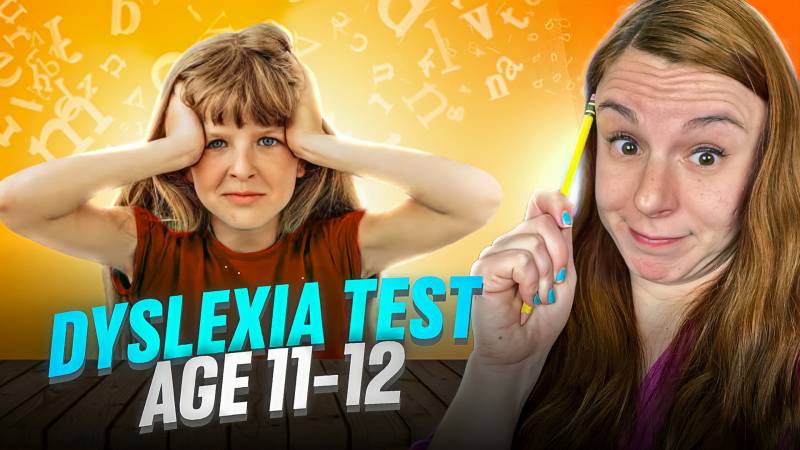
Quickly screen an 11 or 12-year-old child by watching the video below. If you need further analysis click the button below the video.
Transcript
Are you concerned your 11 or 12 year old may have dyslexia? It’s a great idea to find out now because the earlier you catch it, the easier it is to treat. Catching it early prevents other problems that would occur if it was missed. So great job on being an aware parent
Hi I’m Samantha from Learning Success and we made this video to help parents catch dyslexia early. Formalized dyslexia testing is simply not available for most people and when it is, it’s extremely expensive. We’re working to fix that. We want to make this information available to all parents who need it. Will you help us with that by hitting the like and subscribe button below?
Thanks, we appreciate that. Let's get to the test.
I’m going to ask you a series of yes or no questions. For every yes answer I want you to add a 1 to your score. At the end we’ll add that up and that will give you a better idea if your child has dyslexia. If needed, I’ll point you to a free resource to get an even more detailed report.
Question #1
Does your child seem intelligent but is struggling in some subjects in school?
#2
Does your child have slow or inaccurate reading?
#3
Does it seem to take your child a lot of mental effort to read?
#4
Does your child not read for pleasure?
#5
Does your child avoid reading out loud?
#6
Does your child have vague and imprecise language?
#7
Does your child use generic words a lot? Words like stuff or things.
#8
Does your child have difficulty remembering names?
#9
Does your child confuse words that sound alike? Like tornado and volcano
#10
Does your child confuse or skip small connector words like for, of, that, an or in when reading aloud?
#11
Does your child have a very limited vocabulary?
#12
Does your child seem to miss parts of conversations?
#13
Does your child have inconsistent spelling? Spelling the same word differently at different times?
#14
Does your child leave out parts of longer words when reading aloud?
#15
Does your child have difficulty getting jokes or puns?
#16
Does your child have difficulty remembering abbreviations? This includes social media abbreviations like IDK or ROFL?
#17
Does your child have problems recognizing new words?
#18
Does your child have an easier time answering questions if something is read out loud to them?
#19
Does your child take longer than expected to do homework?
#20
Does your child seem uncoordinated?
#21
Does your child have difficulty with multiple choice tests?
#22
Does your child have trouble remembering instructions?
#23
Does your child ever express that they feel stupid?
Okay what’s your score?
If your score adds up to three or more, then there is a possibility of dyslexia or something related. It doesn’t mean it’s dyslexia, just that you should dig a little deeper. Here’s how to do that. We’ve created a free deep dive dyslexia screener for you. Fill it out and then it will send you a free report. That report will help you understand what type of dyslexia is likely. It will help you find the specific areas where your child is having trouble and also give you suggestions on how to fix them.
The link is in the description. It’s totally free. And we promise it will help you and your child. So jump down to the description, click the link, and do that screener now.
Timecodes
00:00 Intro
00:40 Test instructions
00:58 Seems intelligent but struggling in school
01:04 Slow or innacurate reading
01:08 Mental effort to read
01:12 Won't read for pleasure
01:16 Avoids reading out loud
01:20 Vague or imprecise language
01:24 Uses generic words a lot
01:32 Difficulty remembering names
01:35 Confuses words that sound alike
01:40 Skips connector words
01:48 Limited vocabulary
01:53 Misses parts of conversations
01:57 Inconsistent spelling
02:04 Skip parts of words
02:09 Trouble understanding jokes
02:13 Trouble remembering abbreviations
02:22 Trouble recognizing new words
02:27 Does better if questions are read out loud
02:32 Homework takes too long
02:37 Uncoordinated
02:40 Trouble with multiple-choice tests
02:45 Trouble remembering instructions
02:50 Feels stupid
02:56 Scoring
03:07 What to do next
Key Takeaways:
“Is your child having difficulty with reading or other academics?” “Wondering if it’s dyslexia?” Use our free dyslexia test to get answers. Simply answer a few easy questions and find out now
You can get this analysis for free by filling out this simple form. This will help you get to the bottom of a learning difficulty and provide you with a solution. If you are ready to put this problem behind you click the button below and fill out the form.










